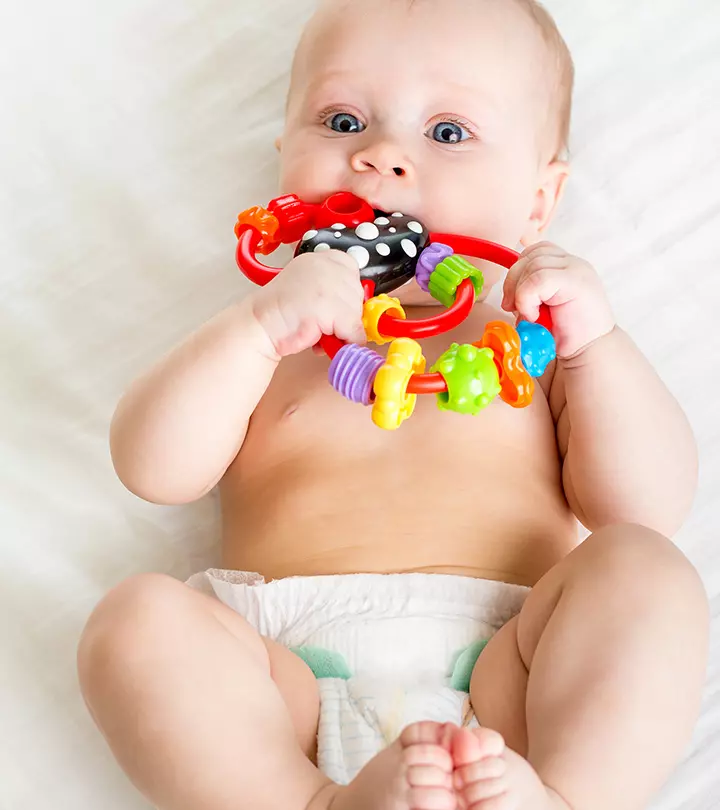

Image: Shutterstock
Maintaining the body’s optimum hydration levels is vital for regulating the physiological functions that promote health and well-being. Since lactating women usually produce more than 750ml of milk every day, their daily water requirement is higher (1). Thus, experts recommend that nursing mothers drink enough water when breastfeeding.

Scroll down to learn more about how much water should be consumed when breastfeeding, whether increased water intake increases your breast milk supply, what happens if you don’t drink enough water, and some tips to ensure optimum hydration while breastfeeding.
How Much Water Should You Drink When Breastfeeding?
The European Food Safety Authority recommends drinking an additional 700ml of water above the daily intake (2). Lactation experts recommend drinking to thirst and a little extra than usual.
Such recommendations might be confusing since the average water intake for each woman is different. Thus, you may follow some simple guidelines (3).
- As a general rule, experts recommend non-pregnant/non-lactating women to drink 11.5 cups a day. Keep your water intake more than 11.5 cups during lactation since you need extra hydration. You may consume a glass of water before and after each breastfeeding session and also during meals.
- Another convenient way to track your hydration level is the color of your urine. In a hydrated state, your urine color will be in pale yellow. It could turn to dark yellow or amber color in the case of insufficient water intake.
For mothers with multiple breastfeeding babies, the recommended water intake is likely to be higher. You may consult your doctor or lactation consultant for the right amount you should consume.
Does Increased Water Intake Increase Breast Milk Supply?
It is usually believed that increased intake of water could increase breast milk supply. However, there is no scientific evidence to this (4). You should focus on being hydrated than increasing your breast milk supply by drinking water.
Although rare, excessive consumption of water may lead to water intoxication that can have detrimental health effects. Also, the consumption of excess water could cause frequent urination, which might cause diversion of water from the breasts and eventually, a decrease in the milk supply.
What Happens If You Do Not Drink Enough Water When Breastfeeding?
The most evident side effect of not drinking enough water is dehydration. Dehydration during breastfeeding could happen due to several reasons, but insufficient water intake is the most prominent one.
In the case of dehydration, you may have any of the following signs and symptoms (5)
.
- Chapped lips
- Dry and itchy skin
- Dizziness
- Muscle cramps
- Fatigue
- Headache
- Dry mouth
- Poor concentration and mood swings
Severe dehydration could have serious health implications, including the need for hospitalization. Such a situation can alter breast milk composition and supply, thus impacting the baby’s health, as well.
Tips To Ensure Optimum Hydration While Breastfeeding
The following measures and practices can help you keep yourself hydrated when breastfeeding (4).
- Listen to your body. If you are thirsty, drink water. Nursing mothers could feel thirstier than normal, hence keep a water bottle handy. If you are unable to drink a glass of water at a time, then you could also have several frequent sips throughout the day.
- Have variety in water since drinking plain water throughout the day might get boring. You may consider adding fresh lemon or lime juice to it or also try infused drinks prepared by adding a couple of cucumber slices and a few fresh basil leaves. This drink will hydrate you while also providing nutrients from cucumber and basil (but not in medicinal doses).
- Avoid carbonated beverages. Instead, drink fresh homemade drinks with less sugar. Carbonated beverages could make you thirstier and also provide your body with unnecessary empty calories.
- Limit the intake of caffeinated beverages such as tea and coffee as they are potential diuretics. Diuretics increase the amount of water lost through urine. Excess consumption of caffeinated beverages can even increase the risk of dehydration.
- Consume fresh fruits and vegetables. You can try adding fruits such as oranges, strawberries, and watermelon, along with vegetables, like lettuce, cucumber, cabbage, and spinach.
- Limit the intake of juices to not more than one to two cups a day. Also, avoid adding sugar to these drinks. Prefer whole fruits and vegetables to juices.
- Include high water content and less fat. A few options that you can try are yogurt, cottage cheese, and ricotta cheese.
- Try ORS: ORS is an oral rehydration solution that is made up of glucose, sodium chloride, potassium chloride, and trisodium citrate (6). This electrolyte drink can be consumed whenever you feel dehydrated. However, ensure that you do not consume it in excess.
- Avoid alcohol intake as it is likely to inhibit the letdown reflex and also affect the body’s water levels. It could have adverse effects on your baby too.
- Use a waterlog or hydration reminder app in case you tend to forget drinking water. These apps could remind you to drink water at regular intervals.
Having enough water while breastfeeding helps maintain a sufficient milk supply and keeps you hydrated. Dehydration during breastfeeding could lead to chapped lips, mood swings, and fatigue. Therefore, you should have the recommended amount of water while nursing your baby and listen to your body. Avoid consuming carbonated drinks and fruit juices instead of water as they increase the amount of sugar in the blood and increase the level of water lost through urine. Including various fruits with high water content, soups, and natural juices will help maintain your hydration.
References
1. Bentley GR; Hydration as a limiting factor in lactation.; National Center For Biotechnology Information
2. Scientific Opinion on Dietary Reference Values for water; EFSA
3. How Much Water Do You Need; Eat Right; Academy of Nutrition And Dietetics
4. Extra fluids for breastfeeding mothers for increasing milk production; Cochrane
5. Dehydration; Medline Plus; US National Library of Medicine
6. Oral Rehydration Salts (ORS) A New Reduced Osmolarity Formulation Reduced Osmolarity Formulation; WHO
Community Experiences
Join the conversation and become a part of our nurturing community! Share your stories, experiences, and insights to connect with fellow parents.
Read full bio of Rebecca Koyf
Read full bio of Swati Patwal














